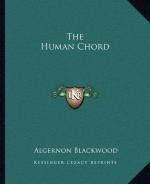“But I can easily make another—such a nippy little beggar, and twice as hoppy as the first. Only I won’t do it,” he added magnanimously, “because it frightens you.”
For to name with him was to create. He had only to run out some distance into his big mental prairie, call aloud a name in a certain commanding way, and instantly its owner would run up to claim it. Names described souls. To learn the name of a thing or person was to know all about them and make them subservient to his will; and “Winky” could only have been a very soft and furry little person, swift as a shadow, nimble as a mouse—just the sort of fellow who would make a conical cap out of a girl’s fluffy hair ... and love the mischief of doing it.
And so with all things: names were vital and important. To address beings by their intimate first names, beings of the opposite sex especially, was a miniature sacrament; and the story of that premature audacity of Elsa with Lohengrin never failed to touch his sense of awe. “What’s in a name?” for him, was a significant question—a question of life or death. For to mispronounce a name was a bad blunder, but to name it wrongly was to miss it altogether. Such a thing had no real life, or at best a vitality that would soon fade. Adam knew that! And he pondered much in his childhood over the difficulty Adam must have had “discovering” the correct appellations for some of the queerer animals....
As he grew older, of course, all this faded a good deal, but he never quite lost the sense of reality in names—the significance of a true name, the absurdity of a false one, the cruelty of mispronunciation. One day in the far future, he knew, some wonderful girl would come into his life, singing her own true name like music, her whole personality expressing it just as her lips framed the consonants and vowels—and he would love her. His own name, ridiculous and hateful though it was, would sing in reply. They would be in harmony together in the literal sense, as necessary to one another as two notes in the same chord....
So he also possessed the mystical vision of the poet. What he lacked—such temperaments always do—was the sense of proportion and the careful balance that adjusts cause and effect. And this it is, no doubt, that makes his adventures such “hard sayings.” It becomes difficult to disentangle what actually did happen from what conceivably might have happened; what he thinks he saw from what positively was.
His early life—to the disgust of his Father, a poor country squire—was a distressing failure. He missed all examinations, muddled all chances, and finally, with L50 a year of his own, and no one to care much what happened to him, settled in London and took any odd job of a secretarial nature that offered itself. He kept to nothing for long, being easily dissatisfied, and ever on the look out for the “job” that might conceal the kind of adventure he wanted. Once the work of the




